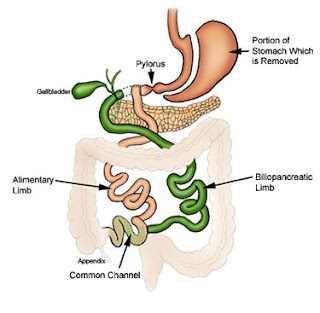What on earth is a Biliopancreatic Diversion with a Duodenal Switch?
from dsfacts.com
Approximately 70% of the stomach is removed along the greater curvature, also called a vertical sleeve gastrectomy (VSG). The remaining stomach is fully functioning, banana shaped and about 3 - 5 oz in size which restricts the amount you can consume. The pylorus continues to control the stomach emptying into the small intestine; as a result patients do not experience "dumping". The upper portion of the duodenum remains in use; food digests to an absorbable consistency in the stomach before moving into the small intestine.
A benefit of removing a portion of the stomach is that it also greatly reduces the amount of ghrelin producing tissue and amount of acid in the stomach. Ghrelin is the "hunger hormone" and by reducing the amount of the hormone produced the appetite is suppressed.
The intestines are switched so that food from the stomach and the digestive juices travel separate paths and don't mix until they meet up towards the end of the small intestine.
The alimentary limb carries the food.
The biliopancreatic limb carries the bile and digestive juices.
The common channel, also known as the common tract or common limb, is the point from where the alimentary and biliopancreatic limbs meet in the small intestine to where they move into the large intestine. The common channel is where a DS patient's food, bile and digestive juices mix and nutrients are absorbed. Since the common channel makes up such a small portion of the small intestine dietary starches, fats and complex carbohydrates are not fully absorbed.
So, why'd you choose a BPD/DS rather than a more common Roux-N-Y gastric bypass?
It came down to this: I could never willingly submit to surgery that might cause me to vomit after I eat sugar. A life without sugar isn't for me (see "The Health Project" and "MAJOR FAIL"). Also, I enjoy my pylorus. Because I have a functioning pylorus I do not have "dumping" syndrome; I can take NSAIDS; and my entire stomach can be scoped if need be. Plus, the long-term weight loss results of BPD/DS are simply the best of any bariatric surgery (see here, here, and here).
And you went to Miami to have it done, and paid for it out-of-pocket?
Yes and yes. It actually reminded me of paying for a homebirth rather than going to the hospital for a "free" birth. I could have had a RNY. My insurance would have covered it. (My insurance would not cover a BPD/DS because I wasn't morbidly obese "enough.") Instead, I paid for it, so I got to call the shots. I chose a surgeon in Miami who is one of the best; he's taught most of the BPD/DS surgeons in this country how to do it. I chose my date (election day 2008. When I came out of anesthesia, I kept asking, Did Obama win? Did he REALLY win? Really? Seriously?) I stayed at my parent's house after the surgery.
What was it like?
There aren't words to describe how sucktastic the first few [-]weeks[/-] months were. I was in so much pain. I cried. I missed my family, as I was away from them for almost two weeks. I could barely walk. My mom had to wipe my ass. She washed me in the shower. Every part of my body hurt. Food tasted weird. Drinking water gave me heartburn so bad I thought I would spit fire. It was the most physically painful experience of my life -- and I've been pregnant with twins, I've given birth without any painkillers, I've had my gallbladder out after an attack of gallstones, I've had dental surgery. My BPD/DS surgery knocked it all out of the ballpark.
But eventually, it got better. Yet it was over six months before I ever said, "I'm GLAD I did this." I lost a remarkable amount of weight, and for the most part, I can eat "whatever I want."
That said, there are downsides.
First and foremost, I spend a LOT of time in the bathroom. Lots.
I've read a LOT of books since this surgery. I've been hospitalized because I spent so much time on the toilet; nothing was staying inside my body.
Secondary to my Toilet Time was a problem with an external thrombosed hemorrhoid also known as "the second most physically painful experience of my life."
There's another downside that Dustin could talk about:
Right now I'm having some issues with bloating. There's nothing like weighing 135lbs at 5'6" and being asked REGULARLY if I'm pregnant. By strangers. To me, it means (1) people are RUDE (2) clearly, I look pregnant enough that strangers feel comfortable asking me when I'm due.
Anyway, over the last nearly-18 months, I've come to the realization that no weight-loss surgery is perfect; everything has it's downsides -- and I'm currently taking Cipro and waiting on a full-abdomenal/pelvic CT scan to rule out anything else.
Having this surgery was really another chapter in my life; I think about it the way I think about my kids. There was life before my BPD/DS. It was good, it was bad -- it was different. There's life after my BPD/DS. It's also good, sometimes bad, but mostly full of positives. I have no regrets about having this surgery. None. I'm so glad that I had it done. I'm so glad that I've lost weight, that I'm healthier than I was, that I extended my life expectancy. I would go back and do it a million times again -- despite the Toilet Time, despite the 'roid rage, despite the gas, despite the bloating.



+(Small).jpg)



0 comments:
Post a Comment